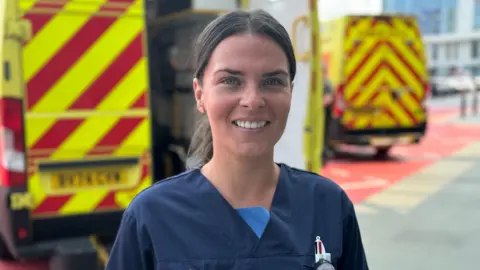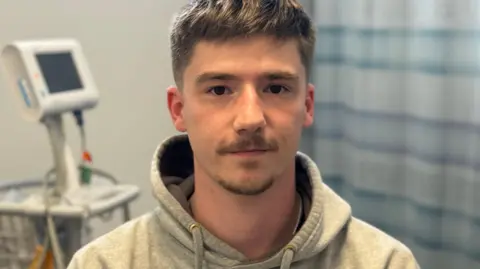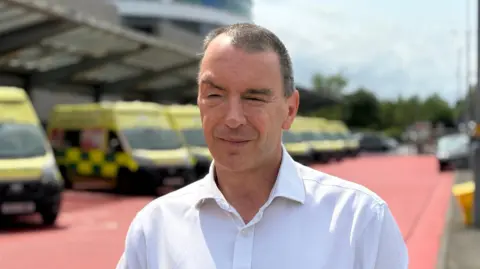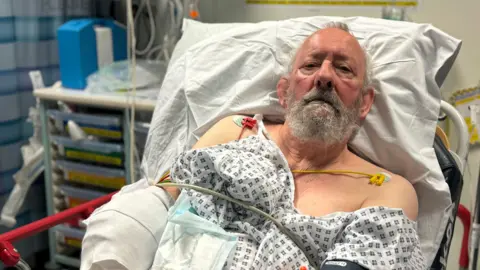Frustrations, delays and hard work: Life in a city's A&E
 BBC
BBC"They could really do with double the staff and double the hospital and probably double the pay as well, for what they have to deal with."
Zac Ranford spoke as his grandfather was moved to a ward at the Queen Elizabeth (QE) Hospital Birmingham after 12 hours in the emergency department.
It is a sentiment the hospital's boss agrees with, and apologised for. Executive director Matt Metcalfe, a former liver surgeon, admitted they did not meet the national target of four-hour waits "far more often than we would like".
But he added: "Time and again our patients and their relatives tell us that, despite the delays and the frustrations that causes, just how well cared for they are."
We have spent time at the hospital as it marks 15 years since it was opened, on 16 June 2010.
Mr Ranford, from Dudley, was at the A&E unit with his grandfather who had fallen.
"It's nothing to do with the staff. The staff have been absolutely amazing, they really have, getting him drinks, food, anything he wanted," he said.
"It's just that they haven't got the facilities to cope with the demand here."

In the emergency department, we saw patients in private bays and a few in a corridor.
Sister Laura Hyslop said their main challenges were the lack of capacity in the hospital, meaning they struggled to get beds to move patients to from A&E.
"So we have people staying here for a long time which creates frustration for us and the patients," she said.
"We're trying to make our patients' journeys as swift as possible but that isn't always the case."

To hit the target, the NHS needs to see 95% of patients within four hours of them arriving.
NHS England said that number had not been met for a "number of years" so the annual target this year is 78%.
When we filmed, 59% of patients were dealt with within four hours at the QE.
Mr Metcalfe said: "We're working with our partners so that as soon as we've delivered the medical care that our patients need and the rehabilitation that must happen in hospitals, we can get them out of hospital as quickly as possible to other trusts and rehabilitation facilities or back home."
University Hospitals Birmingham has come under fire over bullying and a toxic culture in the past couple of years.
In September 2023, an independent review commissioned by the trust found that more than half of staff said they felt bullied or harassed, leading to UHB apologising for "unacceptable behaviours".
A report by the Care Quality Commission, published in 2024, rated the hospital overall as "requires improvement". Earlier this year the trust was inspected again, but the results have not yet been made public.
In the last two years there have been changes in leadership and there is now a "wise council" of about 1,000 staff who are consulted on decisions and act as a sounding board for colleagues.
A trust spokesperson said the most recent staff survey results showed "promise".
Mr Metcalfe added: "I've been here about 18 months now and of course I'm aware of the history.
"Since I arrived I have to say I don't recognise the description and that's a great credit to the leadership of the trust as a whole in the turnaround that they have driven.
"I can't comment in detail of what the culture was like before. All I can say is that I have arrived in a hospital that the quality and excellence of the individuals delivering an extraordinary array of care is like none in any hospital I've worked in before."

Earlier this year, UHB said it was looking at losing about 300 roles as part of cost saving measures this year to achieve savings of 5%, worth roughly £130m of its £2.6bn annual budget.
At the time, the hospital said engaging staff in the process was key.
More positively, the trust said its recruitment of nursing staff had improved.
In 2023, vacancy rates on average rose to almost 20% of it's total staffing but as of this week, they were below 3%.
Back in the emergency department, great-granddad Douglas Crowe is about to go to theatre after severing an artery when he fell on a sharp piece of furniture at home in Birmingham.
"My wife was there so she called an ambulance because she could see how much blood I was losing," he said.
From midnight to 18:30 BST, more than 340 patients have come through the doors that day in A&E.
"Sometimes you can go home and feel a little bit sad," Sister Hyslop admitted.
"We think of people as how we would like our family to be treated when they come through the door.
"We try to treat them as well as we can, but sometimes with the pressures it's hard to give them that extra mile that we'd want to."
Follow BBC Birmingham on Facebook, X and Instagram. Send your story ideas to: [email protected]
